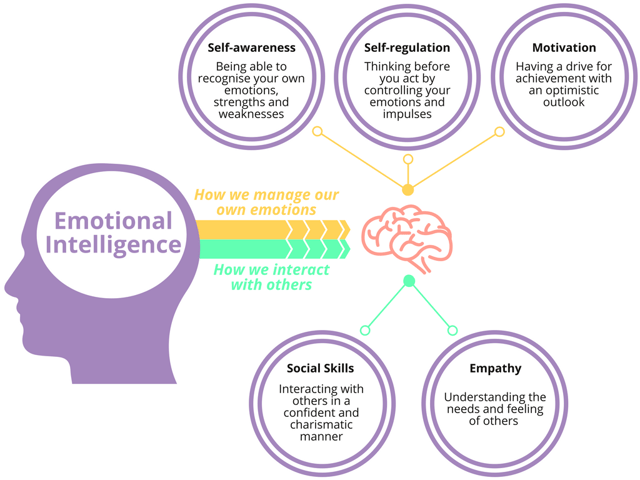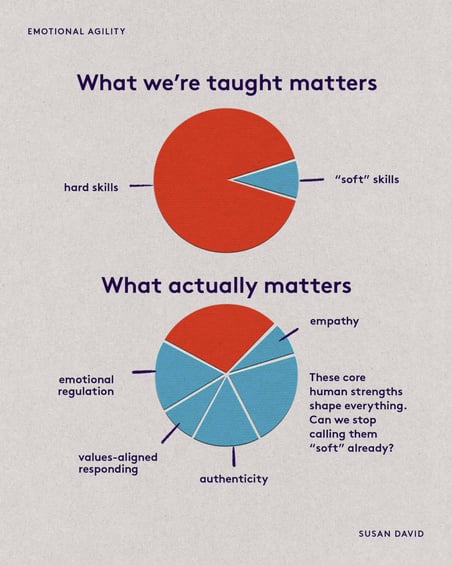What's The Deal With Emotional Intelligence?
 Chloe Martin
·
3 minute read
Chloe Martin
·
3 minute read
Emotional Intelligence (EI) is not just a hyped-up corporate buzzword, it’s an ability which is becoming essential for professional development at all levels.
But why is it beneficial to you?
So, What is Emotional Intelligence?
In simple terms, Emotional Intelligence (EI) is the ability to manage and recognise your own emotions and the emotions of those around you.
A study by TalentSmart found that 90% of top performers have a high level of EI. Typically, these people can manage pressure with ease, gain respect from colleagues and motivate themselves and others for achievement.
There are five key areas of EI:
Why Does Emotional Intelligence Matter in the Workplace?
In today's fast-paced and ever-changing work environment, hard skills are no longer sufficient to ensure success.
Emotional intelligence has become increasingly recognised and valued as a critical skill in the workplace. Senior managers are realising that employees with high levels of emotional intelligence can bring numerous benefits to their organisation.
Expert Psychologist and best-selling Author, Susan David, explains how the view of emotional skills has an enormous impact on organisations.
She says, "When we turn away from our emotions, we perpetuate a dehumanised view of people as “resources,” undermine the effectiveness of change strategies, shelter poor leaders based on their ability to “deliver results” (regardless of their impact on culture and psychological safety), and fail to recognize that employee wellbeing is integral to overall organisational success."
What are the Benefits of EI in the Workplace?
1. It creates a positive office atmosphere
When there is a team leader or manager with high EI, it often filters down to their subordinates. The office environment becomes positive and collaborative as team members value each other’s ideas and trust one another. With high team morale comes high team performance. Staff start enjoying the work they do and appreciate those that they work with and as a result, collective ideas and thoughts are forged.
2. A positive team needs a positive leader
This is the key benefit of high EI. There are many traits you will associate with effective leadership but EI is a crucial one. It will boost your influence and management ability over staff.
Stress is just one of many difficulties that come with management, but how you react to stress is essential. Shouting, finger pointing and passive-aggressive behaviour are traits we often associate with leaders who have low EI. A stressful environment is formed because leaders don’t know how to handle their own emotions in times of difficulty. Ultimately, this rubs off onto their subordinates.
Leaders with high EI know exactly how to control their own emotions and how they affect those around them. In a stressful environment, these leaders will carefully calculate how they behave and interact with others. The result of this? A positive team with a positive atmosphere with employees feeling calm and stress-free.
Organisations are now starting to look for these types of leaders. If you’re looking to move up the career ladder, it is vital for you to have a high level of EI.
3. Staying Ahead of Competitors
As I just mentioned, organisations are now starting to realise the importance of EI in the workplace. This is why it’s essential to now get ahead of the game and adopt an EI-friendly environment. Organisations with poor EI could have teams with low motivation, commitment and performance.
Applying EI in your workplace will give you the upper hand. You will have a team who are not fazed by change or pressure, a team who enjoy their work and a team who have great chemistry with each other.
Discover 5 ways emotional intelligence can help you become a more successful leader.
How to Apply EI at Your Workplace?
There are two things which can be done at your organisation. The first is alter your hiring process by looking to hire people with high levels of EI. Do this by simply asking questions like “How do your colleagues benefit from working with you?” and “What motivates you to do your work?” you can get a good assessment on a candidate’s EI level.
The second, provide yourself and your organisation with training to improve EI. With the right guidance and help, your organisation can learn how to tailor emotions around colleagues and subordinates. From this, you will enhance you own professional development whilst boosting your organisation's performance and employee well-being.
Want to Learn More About EI? Attend our Masterclass
Our half-day Masterclass is the perfect way to gain the tools and expert advice you need to develop your emotional intelligence, become more self-aware and create an engaged workforce. Read the full agenda for our Masterclass: Applying Emotional Intelligence.
2+ years in SEO and content marketing. Striving to help public sector professionals develop their skills and learn something new through high-quality content.









